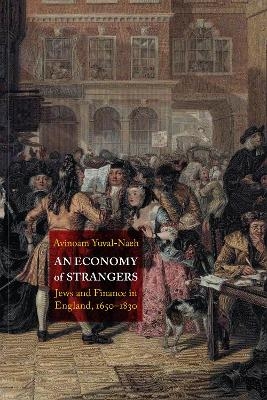
An Economy of Strangers
University of Pennsylvania Press (Verlag)
978-1-5128-2505-3 (ISBN)
In An Economy of Strangers, Avinoam Yuval-Naeh historicizes this association by focusing on one specific time and place—the financial revolution that England underwent from the late seventeenth century that coincided with the reestablishment of the Jewish population there for the first time in almost four hundred years. European Christian societies had to that point shunned finance and constructed a normative system to avoid it, relying on the figure of the Jew as a foil. But as the economy modernized in the seventeenth century, finance became the hinge of national power. Finance’s rise in England provoked intense national debates. Could financial economy, based on lending money on interest, be accommodated within Christian state and society when it had previously been understood as a Jewish practice?
By projecting the modern economy and the Jewish community onto each other, the Christian majority imbued them with interrelated meanings. This braiding together of parallel developments, Yuval-Naeh argues, reveals in a meaningful way how the contemporary and wide-ranging association of Jews with the modern economy could be created.
Avinoam Yuval-Naeh is a post-doctoral fellow at the University of Haifa. He is the author of articles in The Journal of Early Modern History and Historia. This is his first book.
Introduction
Part I. Usury
Chapter 1. Jewish Usury, Jewish Historiography, and the Readmission Polemic of the 1650s
Chapter 2. Usury and the Re-narration of the Ancient Israelite Society
Chapter 3. English Ethnography and the Economy of the Jews
Part II. Finance
Chapter 4. Jews and the Financial Revolution
Chapter 5. The 1753 Jewish Naturalization Bill and the Polemic over Public Credit
Chapter 6. Jews, Finance, and Gender on the Stage and Beyond
Chapter 7. Finance and the Eschaton
Part III. Reform
Chapter 8. Economic Crime and Criminal Economy
Chapter 9. Jews and English Civil Society: Between Cumberland’s The Jew and the Campaign for Emancipation
Epilogue
Notes
Index
Acknowledgments
| Erscheinungsdatum | 21.12.2023 |
|---|---|
| Reihe/Serie | Jewish Culture and Contexts |
| Zusatzinfo | 11 b/w |
| Verlagsort | Pennsylvania |
| Sprache | englisch |
| Maße | 152 x 229 mm |
| Themenwelt | Geisteswissenschaften ► Geschichte ► Regional- / Ländergeschichte |
| Geschichte ► Teilgebiete der Geschichte ► Kulturgeschichte | |
| Geschichte ► Teilgebiete der Geschichte ► Wirtschaftsgeschichte | |
| ISBN-10 | 1-5128-2505-0 / 1512825050 |
| ISBN-13 | 978-1-5128-2505-3 / 9781512825053 |
| Zustand | Neuware |
| Haben Sie eine Frage zum Produkt? |
aus dem Bereich


